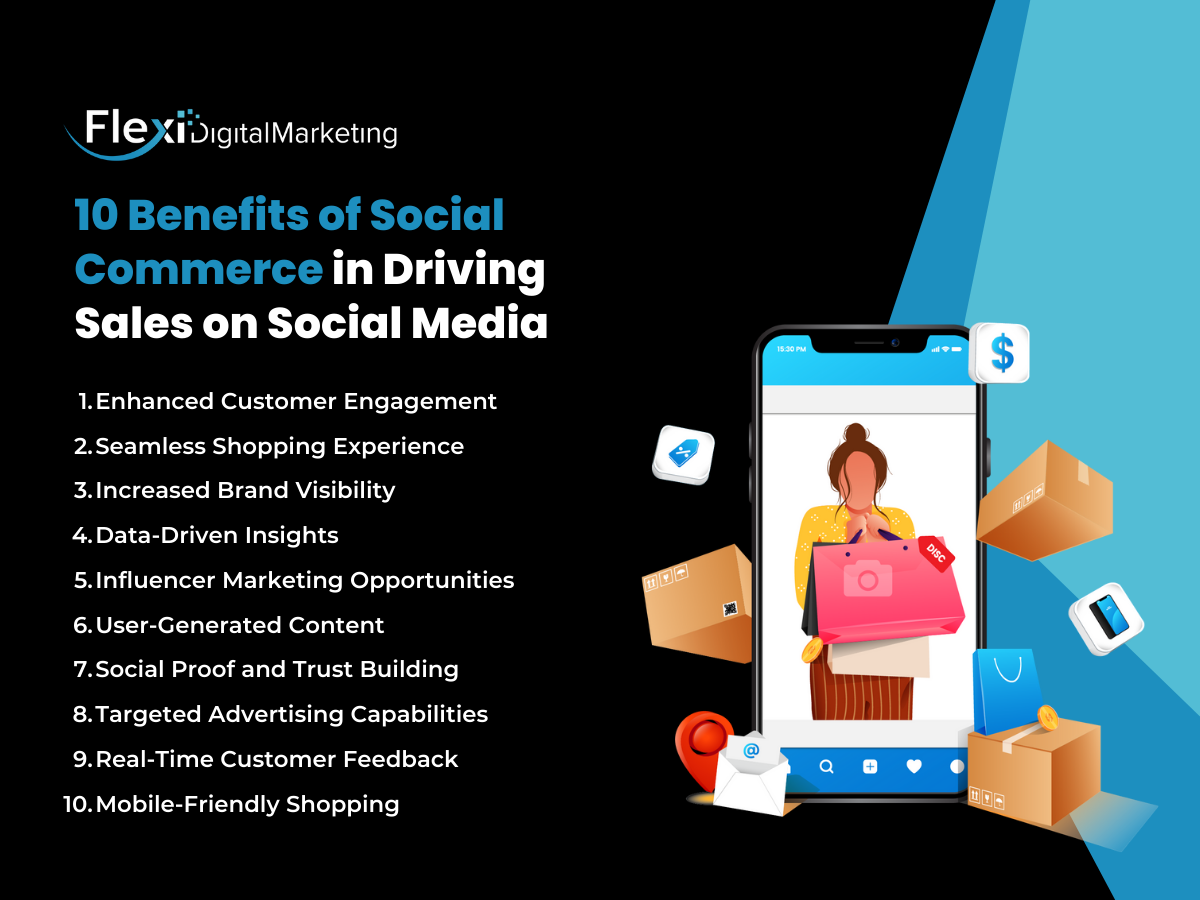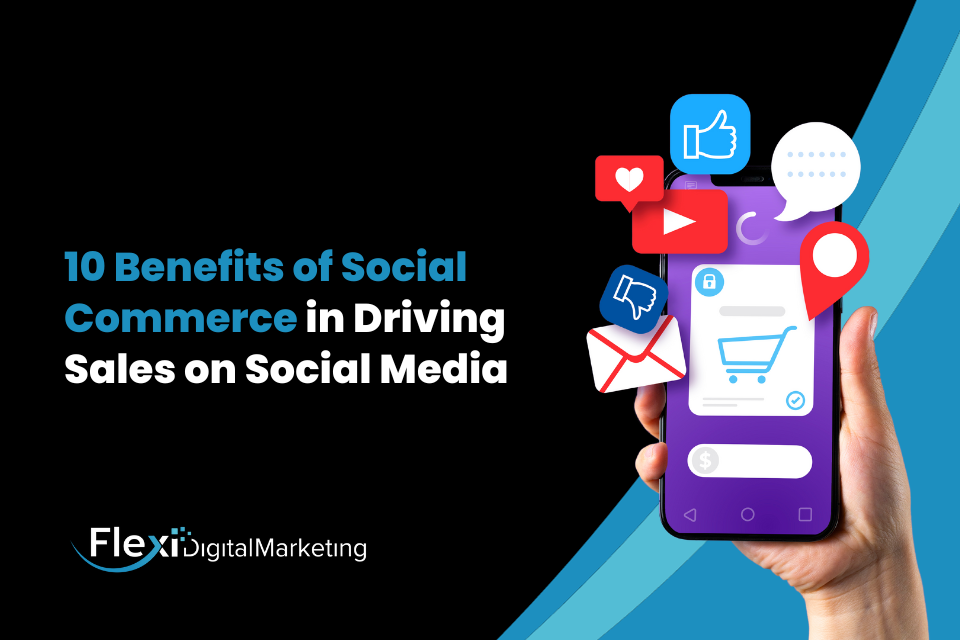In the ever-evolving digital marketing landscape, staying ahead of the curve is crucial for business success. One such trend that has gained immense traction in recent years is social commerce.
With an increasing number of consumers spending a significant portion of their time on social media platforms, brands are leveraging this opportunity to drive sales and boost their overall growth. In this article, we'll delve into the benefits of social commerce and explore how it's becoming a game-changer for businesses.
What is social commerce?
Social commerce refers to the integration of e-commerce functionalities into social media platforms. It's a seamless blend of social interactions and online shopping, allowing users to discover, research, and purchase products directly within their favorite social apps. This paradigm shift in consumer behavior presents a myriad of opportunities for businesses to connect with their audience in new and innovative ways.
10 Benefits of Social Commerce for Brands
Social commerce involves the integration of social media and online shopping, creating a seamless shopping experience for users. Brands are capitalising on the power of social platforms to enhance their online presence and engage with customers in new and exciting ways.
Likewise, here are 10 benefits of social commerce:

1. Enhanced Customer Engagement
One of the top benefits of social commerce is that it provides brands with a unique opportunity to engage with their customers more personally. Through social media platforms, brands can create and share content that resonates with their target audience. Whether it's through interactive posts, engaging videos, or real-time updates, social commerce allows brands to establish a direct and meaningful connection with consumers.
This enhanced engagement fosters a sense of community around the brand, making customers more likely to stay loyal and advocate for the brand within their social circles.
2. Seamless Shopping Experience
Integrating shopping features directly into social media platforms streamlines the purchasing process for consumers. Brands can now showcase their products, provide detailed product information, and even facilitate transactions without redirecting users to external websites.
These benefits of social commerce and seamless shopping experience reduce friction in the customer journey, making it more convenient for users to make impulse purchases or explore new products. As a result, brands can capitalise on the impulsive nature of social media users and drive more sales.
3. Increased Brand Visibility
Social media platforms boast billions of active users, presenting a massive audience for brands to tap into. By leveraging social commerce, brands can significantly increase their visibility and reach a broader audience.
Features like sponsored posts, influencer collaborations, and targeted advertising enable brands to showcase their products to users who may not have discovered them through traditional marketing channels. This increased visibility can translate into higher brand awareness and, ultimately, more potential customers, a one-of-a-kind benefits of social commerce.
4. Data-Driven Insights
Social commerce platforms provide brands with valuable data and insights into consumer behavior. Through analytics tools, brands can track user engagement, monitor the performance of their social commerce campaigns, and gain a deeper understanding of their target audience.
This data-driven approach allows brands to refine their strategies, optimise their campaigns, and tailor their offerings better to meet the preferences and expectations of their customers. In essence, social commerce empowers brands with the information they need to make informed decisions and stay ahead of market trends.
5. Influencer Marketing Opportunities
One of the top benefits of social commerce is Influencer marketing. It has become a powerful tool for brands looking to connect with their audience authentically. Social commerce seamlessly integrates with influencer marketing, allowing brands to collaborate with influencers to promote their products directly within social media platforms.
With their dedicated followers, influencers can effectively endorse products and drive sales through their social channels. This creates a win-win situation, where influencers gain monetisation opportunities, and brands benefit from the trust and credibility that influencers have built with their audience.
6. User-Generated Content
One of the most significant benefits of social commerce is the ability to leverage user-generated content (UGC). UGC serves as a powerful endorsement, as potential customers are more likely to trust the opinions and recommendations of their peers.
Brands can encourage customers to share their experiences, reviews, and photos of products, creating a dynamic and authentic content feed. By showcasing UGC on social commerce platforms, brands build trust and create a sense of community around their products.
7. Social Proof and Trust Building
Consumers are more likely to trust a brand that is recommended or endorsed by their peers. Social commerce provides a platform for brands to accumulate social proof – evidence that others have had positive experiences with their products. Features such as customer reviews, ratings, and testimonials contribute to building trust and credibility.
When potential customers see that others have had a satisfactory experience, they are more inclined to make a purchase. This trust-building aspect is invaluable in a digital landscape where authenticity and reliability are crucial in consumer decision-making.
8. Targeted Advertising Capabilities
Social commerce platforms offer advanced targeting options for advertising, enabling brands to tailor their messages to specific demographics, interests, and behaviors. This level of precision in targeting ensures that brands can reach the most relevant audience for their products.
Whether it's age, location, interests, or online behavior, social commerce platforms provide the tools to create highly targeted and personalised ad campaigns. This maximises the efficiency of advertising budgets and increases the likelihood of converting potential customers into actual buyers.
9. Real-Time Customer Feedback
Social commerce facilitates real-time communication between brands and customers. This instant connection lets brands gather immediate feedback on products, services, and marketing campaigns. Brands can monitor comments, reviews, and messages, gaining valuable insights into customer satisfaction and preferences.
This real-time feedback loop is instrumental in making quick adjustments to improve customer experiences and address any issues promptly. The ability to respond in real-time also showcases a brand's commitment to customer service, further enhancing the overall customer experience.
10. Mobile-Friendly Shopping
With the increasing reliance on smartphones for online activities, social commerce aligns perfectly with the mobile-centric habits of modern consumers. Social media platforms are predominantly accessed through mobile devices, and social commerce features are designed with mobile users in mind.
These benefits of social commerce and mobile-friendly approach ensure that brands can reach and engage with their audience wherever they are, providing a convenient and accessible shopping experience. The seamless integration of social commerce into mobile apps ensures that brands can effectively tap into the growing market of mobile shoppers.
5 Tips for Implementing Social Commerce
Implementing social commerce successfully requires a strategic approach. Here are five essential tips to help businesses make the most of this evolving trend:
- Choose the Right Platforms. Identify the social media platforms where your target audience is most active. Focus your social commerce efforts on those channels to maximise impact.
- Create Engaging Content. Develop visually appealing and informative content that resonates with your audience. High-quality images, videos, and interactive elements can enhance the shopping experience.
- Optimise for Mobile. Ensure that your social commerce features are mobile-friendly. Mobile optimisation is crucial for capturing users' attention who shop predominantly through smartphones.
- Implement Secure Payment Options. Build trust by offering secure and convenient payment options. Users should feel confident that their financial information is protected when making purchases through social commerce.
- Monitor and Analyse Performance. Regularly analyse the performance of your social commerce efforts. Use analytics tools to track key metrics, understand customer behavior, and make data-driven improvements to your strategy.
| Social Commerce, Social Media Marketing, Brand Sales, E-commerce Strategies |
Conclusion
As social commerce redefines the e-commerce landscape, brands embracing this trend gain significant advantages. The benefits, ranging from increased reach and engagement to data-driven insights, make social commerce an essential component of a modern marketing strategy.
By following best practices and staying attuned to consumer preferences, businesses can leverage social commerce to drive sales and foster long-term customer relationships. Ready to boost your brand's sales through social commerce? Contact Flexi Digital Marketing to start your project today!


